In the realm of household cleaning, dish soap reigns supreme for its effectiveness against stubborn grime and everyday dirt. Its reliable and multi-faceted nature has made it a go-to solution for many cleaning challenges. Yet, not all surfaces or items bode well under its influence. Misusing dish soap on particular materials or living beings can lead to adverse effects, diminishing their quality and well-being. In the quest for cleanliness, it’s crucial to discern when to avoid this kitchen staple and opt for alternative solutions.
Mirrors
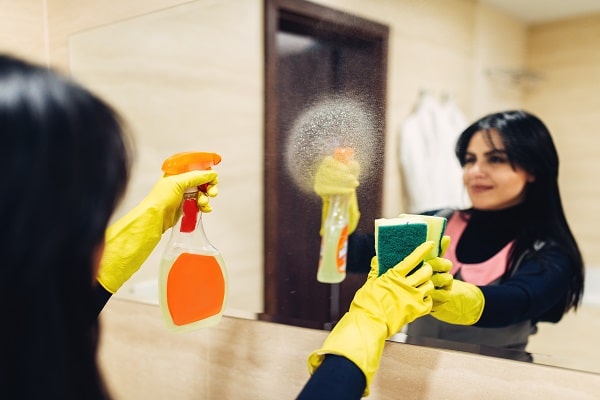
Mirrors, though seemingly easy to clean, possess a delicate surface that demands careful attention. When dish soap comes into the equation, the outcome is often less than satisfactory. It can leave unsightly streaks and residues, which distort the reflection and diminish the mirror’s clarity. Over time, these residues can become more challenging to remove and may permanently mar the mirror’s surface.
Opting for alternative cleaning methods is the key to preserving the integrity of mirrors. A combination of white vinegar and water, for instance, can be a simple yet effective solution. The vinegar breaks down grime without leaving behind a residue, allowing mirrors to retain their shine and clarity. Another option is using specially formulated glass cleaners, which are designed to be streak-free.
Your Car
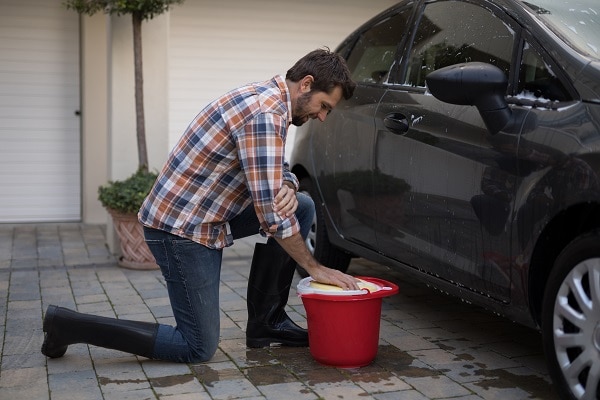
The exterior of a car is more than just metal; it’s a combination of paint, protective coatings, and often, a layer of wax or sealant. Dish soap, formulated to break down and strip away grease, can also strip away these protective layers. Without this protection, a car’s paint becomes more susceptible to sun damage, oxidization, and environmental contaminants, all of which can speed up the wear and tear of the vehicle’s appearance.
For optimal care, investing in a proper car wash soap is essential. These soaps are tailored to clean effectively while maintaining the protective layers on the car’s surface. Moreover, they often come with additional benefits, such as UV protection or added shine, ensuring the car not only remains clean but also looks its best.
Hardwood Floors

The timeless elegance of hardwood floors can be easily overshadowed if cleaned with the wrong products. Dish soap, while effective for many tasks, is not suited for this purpose. It tends to leave a dulling residue on hardwood, masking its natural shine and beauty. Over time, this residue accumulates, making the floor appear lackluster and can potentially damage the protective finish, leading to costly repairs or refinishing.
To keep hardwood floors looking their best, it’s vital to use cleaning agents specifically formulated for wood. These products clean the surface without leaving behind any damaging residues. Additionally, periodic polishing with the right product can further enhance the floor’s appearance, highlighting its natural grain and luster. Regular maintenance ensures these floors remain a stunning centerpiece in any home for years to come.
Your Face
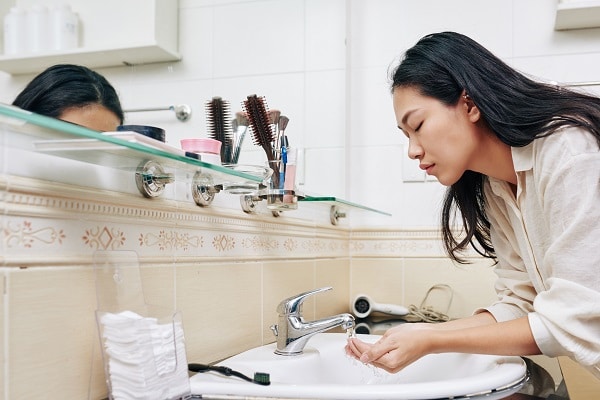
The skin, especially on the face, is a sensitive organ. While dish soap excels at cutting through grease on dishes, its harsh composition can strip the face of its natural oils. This can lead to increased dryness, irritation, and potential breakouts. Furthermore, the alkaline nature of most dish soaps can disrupt the skin’s natural pH balance, which is crucial for maintaining a healthy skin barrier and preventing infections.
Instead of reaching for the dish soap, it’s recommended to use cleansers specifically formulated for facial skin. These products are designed with the right balance of ingredients to cleanse effectively while maintaining hydration and skin health. Whether one has oily, dry, combination, or sensitive skin, there’s a facial cleanser tailored to address those needs, ensuring optimal skin health and appearance.
Leather
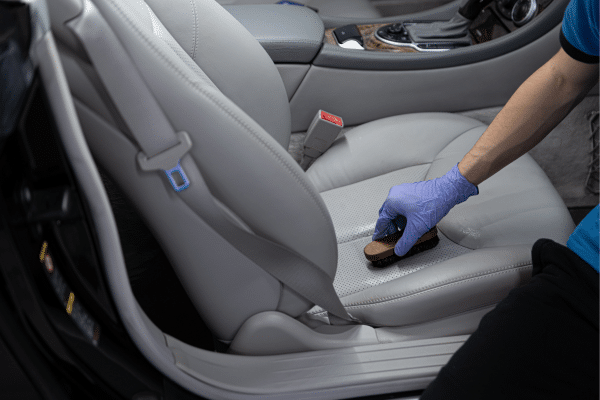
Leather, with its rich texture and durability, requires a certain level of care to maintain its aesthetics and longevity. Using dish soap on leather goods is a surefire way to shorten their lifespan. Dish soap can dry out the leather, causing it to become brittle, which can lead to cracks, discoloration, and an overall compromised appearance.
Proper leather care involves using products that provide the necessary moisture and protection. Leather conditioners and cleaners are specifically designed to nourish the material, keeping it supple and resistant to wear. Periodic conditioning can significantly prolong the life of leather goods, ensuring they retain their beauty and function for years, if not decades.
Your Dog
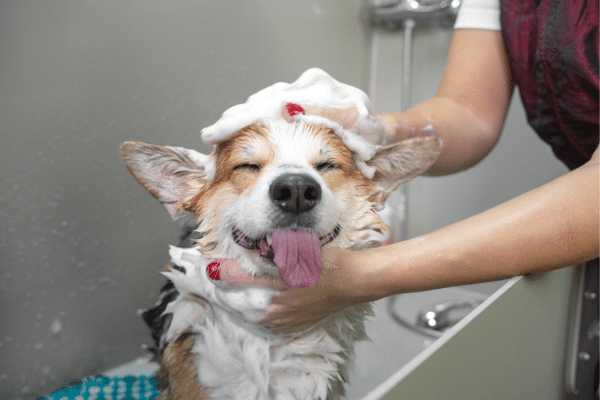
A dog’s skin and coat have specific needs that differ significantly from human skin or household items. While dish soap might seem like a quick solution for a muddy pup, it can be harsh on their skin. The ingredients designed to tackle tough grease can disrupt a dog’s natural skin barrier, leading to dryness, itching, and potential irritations. Moreover, the fragrances and additives in dish soap can further exacerbate skin issues in sensitive pets.
Opting for a dog-specific shampoo is essential for maintaining the health and shine of a dog’s coat. These shampoos are formulated considering the pH level and sensitivities of canine skin. They clean effectively while ensuring the skin remains moisturized and balanced. Regular grooming with the right products keeps dogs looking and feeling their best.
Plants
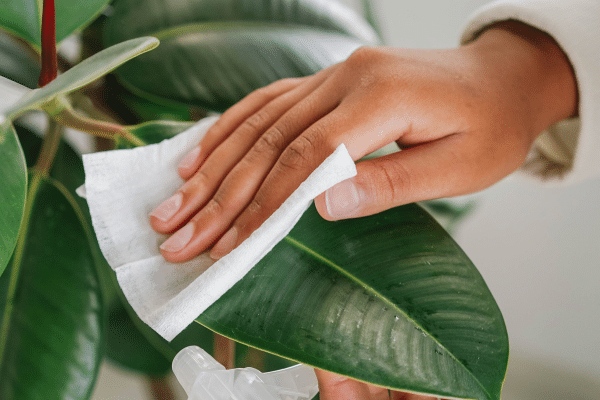
Plants, whether ornamental or functional, breathe through their leaves. Applying dish soap, in hopes of giving them a clean shine or even as a homemade pest solution, can create a residue that hampers this essential process. The filmy layer left behind can block light absorption, crucial for photosynthesis, and might even attract more dust and dirt.
For those looking to rid their plants of pests or give their leaves a shine, it’s advisable to use insecticidal soaps or neem oil, both of which are designed to be gentle on plants while effectively combating pests. To clean dusty leaves, simply using a damp cloth to gently wipe them down can suffice. It’s always essential to ensure any product used on plants is safe and won’t inhibit their health and growth.
The Bottom Line
Knowledge is power when it comes to cleaning and maintenance. While dish soap stands out as a versatile cleaning agent, its application should be limited to appropriate tasks. By understanding where it should not be used, one can extend the lifespan and maintain the quality of various items and beings in the household. In a world filled with diverse materials and needs, selecting the right tool for the job is paramount.



